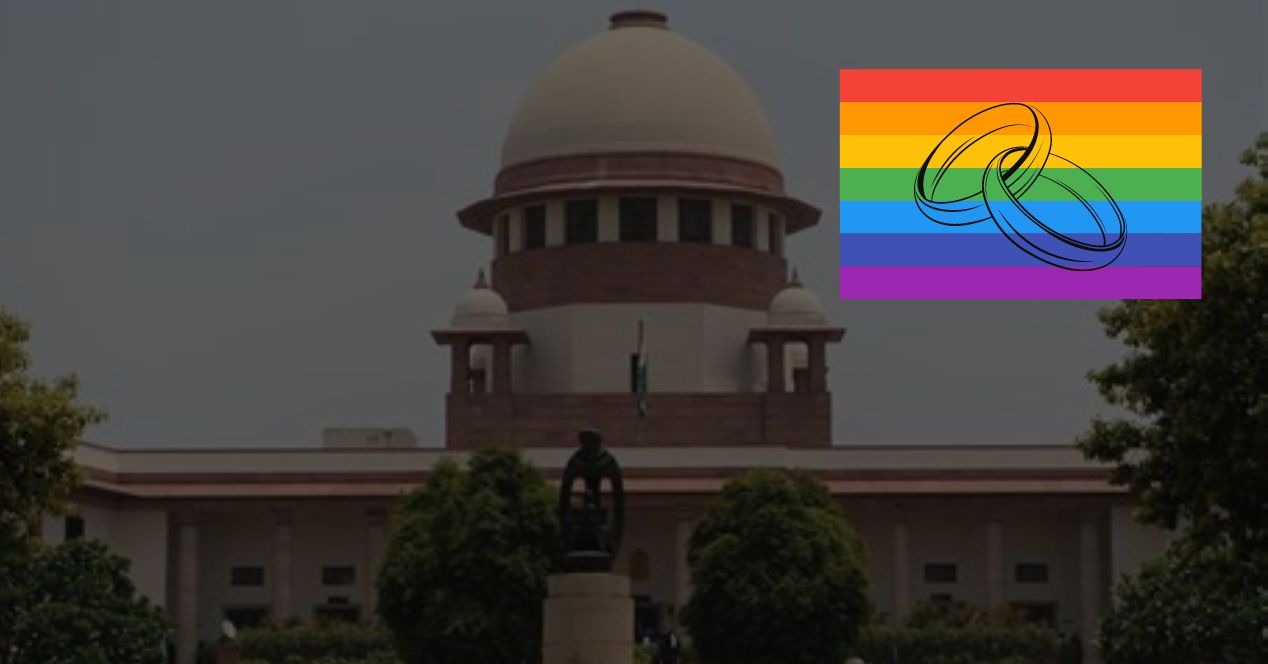Plea for Marriage Equality: Constitution Bench Day #8
Plea for Marriage EqualityJudges: D.Y. Chandrachud CJI, S.K. Kaul J, S.R. Bhat J, Hima Kohli J, P.S. Narasimha J
Last week, the Bench urged the parties to discuss potential ancillary rights that could be granted to queer couples through administrative ‘tweaks.’ Today, the Bench is expected to hear updates on these possible administrative changes.
Background
On November 14th, 2022, two same-sex couples filed writ petitions in the Supreme Court seeking legal recognition of same-sex marriages in India. The petitions were centred around the constitutionality of the Special Marriage Act, 1954 (the Act).
The petitioners argued that Section 4(c) of the Act only recognises marriage between ‘male’ and a ‘female’ persons. This discriminates against same-sex and other queer couples by denying them the same matrimonial benefits as heterosexual couples.
According to petitioners, the non-recognition of same-sex marriage violates the rights to equality, freedom of expression and dignity. They claimed that the SC’s judgements in NALSA vs Union of India (2014) and Navtej Singh Johar vs. Union of India (2018) recognised non-binary gender identities and guaranteed equal rights to homosexual persons. However, since no law regulates queer marriages, queer couples are denied the practical benefits that flow out of marriage such as inheritance, insurance, adoption, etc.
On March 12th, 2023, the Union filed a Counter Affidavit opposing same-sex marriages. They claimed that ‘the notion of marriage itself necessarily and inevitably presupposes a union between two persons of the opposite sex’.
On March 13th, 2023, a 3-Judge Bench led by CJI D.Y. Chandrachud referred the case to be heard by a 5-Judge Constitution Bench as it involved constitutional as well as statutory questions of law.
Sr. Adv Dwivedi: Right to Marry is Not a Fundamental Right
Continuing his arguments from last week, Mr. Dwivedi claimed that the right to marry did not flow from any Article under Part III of the Constitution. Justice S.R. Bhat, taking a step back from the case, posed a broader question to Mr. Dwivedi: Does a fundamental right to marry exist? Mr. Dwivedi did not think so. He pointed out that marriage flows from traditions, personal law, and religion, all of which recognise only heterosexual marriages.
Further, Mr. Dwivedi reiterated the arguments made by him and the Solicitor General last week that any changes to this social institution must be done by Parliament and not the SC.
Justice Bhat intervened by stating that the institution of marriage has evolved over the years. He pointed out that Articles 14, 15, and 17 broke widely accepted traditions by prohibiting discrimination and abolishing untouchability. The Constitution itself is a tradition breaker, he emphasised. Earlier, even inter-caste and inter-religious marriages were not permissible by society. However, today they have social and legal acceptance.
CJI D.Y. Chandrachud summed up the elements of marriage as follows:
- Marriage postulates the right to cohabit.
- Marriage recognises a family unit.
- Marriage leads to procreation. However, this is not a condition as people may choose to not have children.
- Marriage gives the couple an exclusive relationship.
- Marriage gives social acceptance.
In this context, the CJI enquired if heterosexuality was intrinsic to the institution of marriage? Mr. Dwivedi maintained that marriage was not a fluid concept and the State had an interest in regulating it. Any changes to this institution needs to be a Parliamentary action.
Sr. Adv. Kapil Sibal: Sexual Unions Cannot be Recognised by a Declaration of the Court
Mr. Sibal commenced his arguments by stating that the petitioners were wrong to seek a declaration from the SC on the ground that Parliament would not do anything. He stated that this restricted the scope of the Parliament.
Further, speaking of the SC’s judgements in NALSA (2014), Puttaswamy (2017) and Navtaj Singh (2018). He clarified that in the first case, the SC dealt with the question of sexual identity of trans persons. In the second, the SC defined the contours of the right to privacy. In the third, the SC decriminalised homosexuality.
However, in the current case the questions were different. They are, firstly to decide if there is a right to sexual unions and secondly to decide if these sexual unions could be legally recognised. The second question could not be answered by a declaration of the SC. Mr. Sibal went on to argue that heterosexual and non-heterosexual couples were separate classes of people. Different instances flow from heterosexual and non-heterosexual marriages. To treat two unequal classes of people equally would defeat the purpose of Article 14. If non-heterosexual marriages must be legally recognised, then Parliament must do so in the same manner it made law for transgender persons.
Sr. Adv. Arvind Datar: The Special Marriage Act Was Meant for Heterosexual Marriages
Sr. Adv. Arvind Datar began by refuting the existence of a fundamental right to marry. He argued that the SC in Puttaswamy (2017), NALSA (2014), and Navtej (2018), only recognised the right to cohabit.
Furthering his arguments, Mr. Datar pointed out if the SC recognises a fundamental right to marry, it would essentially be declaring a law. This would prohibit Parliament from debating on the matter. Based on our Constitutional structure, law must be a combination of law by Parliament and the Court. CJI Chandrachud enquired if Mr. Datar meant that the SC cannot recognise a right. Mr. Datar responded that the Court could do so, but future law must take this into account.
Mr. Datar claimed that the SC does not have the means to effectively implement and enforce its decisions. Declaring the rights of same-sex couples must, as per Article 246, be left to the legislative domain.
Finally, tracing the evolution of the SMA, Sr. Adv. Arvind Datar stated that this Act was enacted in 1954 to recognise inter-caste and inter-religious marriages. Therefore, the petitioners could not challenge the Act today on the ground that it violates constitutional principles because it did not include non-heterosexual persons.
Arguments will resume tomorrow (May 10th, 2023)

